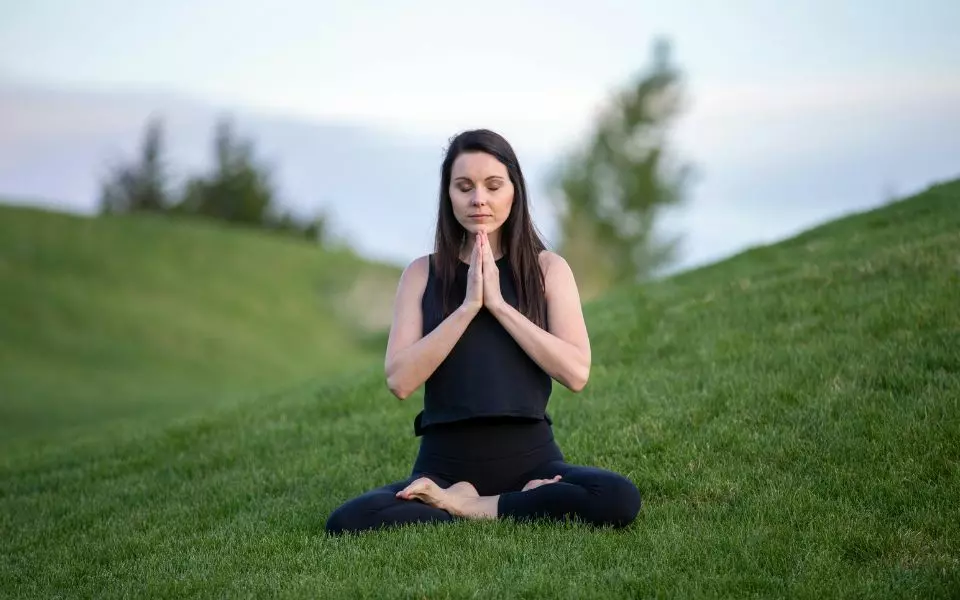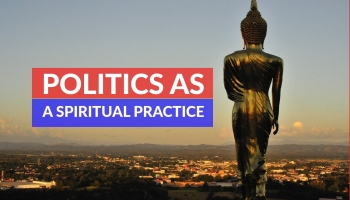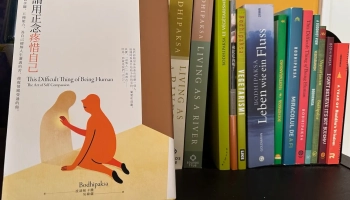
[ad_1]
When people turn to meditation, they encounter a world of terms they may have never encountered before. Merkaba meditation has been around for a good amount of time, but there may still be a variety of questions surrounding what it actually means.
400+ Free Guided Meditation PracticesDeclutter The Mind will help you live more mindfully and understand your mind better with a growing library of free guided meditation practices, courses, and daily meditation practices.
What is Merkaba Meditation – The Definition of Merkaba
Merkaba — also spelled “Merkabah” or “Merkahbah” — is the Hebrew word for “chariot” in the book of Ezekiel. It usually refers to the throne of God, describing a vehicle in which many angels escort him to appear in front of others. This is the best description of the word itself, but its application in meditation is slightly different.
In meditation, Merkaba holds three meanings — “Mer” stands for light, “Kah” stands for spirit and “Bah” means body. While it is unclear what language this is directly translated from, those who practice meditation connect this term to Egyptian symbolism.
In Egypt, Mer means pyramid. It’s believed that the Great Pyramid is a monument ascending to the sun in the sky, toward light. It’s also a nod to the intricate pattern of the ancient Merkaba star. Apart from being a three-dimensional star tetrahedron, it appears to have two pyramids entwined with one another.
Meanwhile, Kah refers to a state of life that sets apart the living from the dead. It is a part of you that has a creative life force or — quite simply — a spirit. It is often confused with Bah, the soul and strength that a person possesses.

Understanding Merkaba Meditation
Merkaba meditation has extremely rich origins and showcases this meditation practice’s complexity. Everyone tends to have their own interpretation. Essentially, it’s a spiritual vehicle that’s used to navigate your own personal energy field.
In essence, each person has their own Merkaba. While it is not physical, meditating with the thought of the revered tetrahedron shape gives you a sense of direction. It can lead you to connect with the universe and nature, dubbed “sacred geometry.” This is because its interconnected lines mimic the spiritual state of what’s actually in your environment.
Under sacred geometry, humans already have an existing relationship with all things in this plane. However, different variables enter a person’s energy field daily. They may feel stressed physically, mentally and spiritually.
As a result, it can be difficult to be attuned to this form of the environment. Tapping into the Merkaba meditation techniques can refresh your energy field and enrich your view of the universe in nature. It’s possible to gain a deeper understanding of yourself and the sacred geometry that surrounds you.
Questions Raised on Merkaba Meditation
Those who have tried out Merkaba meditation may share tales of astral travel, time travel, psychic abilities and more. However, there’s little scientific evidence of this, which is more than understandable. It can be difficult to document such experiences.
Another thing to highlight is that people who practice meditation have had negative experiences. Accounts may describe that they’ve reached a place of darkness or absolute emptiness after such reflection. Some may feel comforted by such discoveries, but others find themselves troubled.
A study finds that 30.6% of people who had no religious belief had a higher chance of going through such an encounter. There’s also the matter of how long they’ve been meditating and whether they’ve been to a meditation retreat before.
Merkaba meditation can work, but the end results can differ from person to person. If you are looking to try it out, preparation is extremely crucial. It’s also recommended to look into meditation practices as a preventative measure rather than a treatment solution.
Seeing the Positives of Merkaba Meditation
Those who want to try out Merkaba meditation may still experience many advantages. Everyone’s background and experience differ. Thus, how you approach and benefit from this meditation practice can also vary.
Ease Depression Symptoms
About 20% of older adults deal with depression. This condition can affect one’s physical and mental health, specifically their heart and cognitive function. They have a higher risk for cardiovascular diseases and episodic memory.
Experiencing high stress and low self-esteem is a by-product of depression. Those who suffer from this disorder may also struggle with anxiety from time to time. Merkaba meditation can help you with managing your emotions and ease your mind.
Meditation helps you process information better. Slow yourself and your energy field down to improve your overall perception. Using your Merkaba can enhance your future response to the stressors that make you sad and restless.
Impact Weight Loss
The Centers for Disease Control and Prevention reveals that 43% of people with depression suffer from obesity. While the Merkaba meditation primarily influences your mental and spiritual health, it can help with the physical aspect, too.
Essentially, people are either extrinsically or intrinsically motivated when losing weight.
Extrinsic motivation relates to superficial reasons for losing weight. They are what your environment influences you to want. For instance, society and the people around you dictate that being thinner will entail popularity and desirability.
Intrinsic motivation sees losing weight as a way of being more attuned to yourself. It’s knowing what your mind and body need. Undergoing meditation can help you have more intrinsic goals that will fuel your weight loss journey in the long run.
Balance Your Energy
Have you ever felt that things around you seem a little off? Do you tend to peer over your shoulder quite a bit? An imbalance in your own energy field, whether it’s from yourself or other factors around you, can increase your stress levels and paranoia.
About 92% of Americans utilize meditation as a way of reducing stress. By trying out Merkaba meditation, you can clear yourself of negativity and center yourself. This also trickles into better sleep quality and calming your mind.
Attain Spiritual Growth
Merkaba is incredibly tied to one’s spiritual state. Undergoing meditation can offer immense personal growth. To some extent, people also liken Merkabah meditation to ascension, confronting the ultimate answer to life.
If you’re new to meditation practices, Merkaba can be overwhelming. There may even be a chance that you won’t encounter a portion of what other people have undergone. However, it still gives you experience on how to confront yourself and the universe around you.
Implore Healing
Meditation has helped with certain disorders, imploring people to collect themselves and focus. For example, practices have made their way to the likes of substance use disorder and post-traumatic stress disorder.
Dr. Ariel Lang, the director of the Center of Excellence for Stress and Mental Health at the VA San Diego Healthcare System, shares how veterans seek forms of meditation for their wellness program. She is transparent in noting that it may not work for some veterans but stresses having a variety of solutions.
Improve Cognition
Merkaba meditation involves deep mindfulness and openness. It’s different from our natural state, where our mind tends to wander and have spontaneous thoughts. It can be a breath of fresh air in terms of self-regulation.
Exercising sensory perception and meta-awareness as you meditate clears distractions in your mind. Zoning into your Merkaba can influence control over your cognitive function and well-being. If you want to better grasp your thought process and constant rumination, this form of meditation is worth a try.
Engaging in Merkaba Meditation
If you’ve come to terms with trying Merkaba meditation, the next question is where and how you’re going to approach this practice. Merkaba meditation can be more demanding as you really need to tap into your energy. There are some guided meditations online, or you can take on the practice yourself, but it’s best to research ahead of the experience.
Preparation
Having the right expectations about Merkaba meditation is important before proceeding. The first is to understand that the techniques are for everyone. While it has had many ties to Greek and Egyptian mythology along with Judaism or Christianity, it goes beyond culture and religion. Everyone can undergo and benefit from Merkaba meditation.
That being said, it can take some time. Certain meditation techniques may only require a minute or two from you, but Merkaba is not as instantaneous. It is a process that involves an abundance of time and patience. It can also be trial and error to experience the spiritual transformation of this practice as it requires so much focus.
Lastly, how a person experiences Merkaba can differ. Aside from how negative or experienced your dive into the universe and nature may be, your journey to getting there is different. Every person’s energy field is incredibly diverse. Even your own Merkaba is different. Thus, the outcome can be quite unique to you.
Breathing
Do you know how most meditation requires you to take one deep breath? Well, the Merkaba has 18 distinct breaths that you need to inhale and exhale. It’s important to take your time with each breath, inhaling for about seven or so seconds before you release.
Here’s an overview of what to visualize throughout the process:
- First breath: The first breath is to open up your heart and experience love for everything. Breathe from both nostrils and store your breath in your stomach, diaphragm and chest for a little bit. When you exhale, take it slow. Repeat this until you feel that you’ve experienced compassion for all.
- Second-fifth breath: Keep the same breathing style as the first breath.
- Sixth breath: For the sixth breath, you can still keep the same breathing style. However, 12 breaths are recommended for this. The first six prop your polarities, while the second set is meant to clear your electromagnetic system.
- Seventh breath: The seventh breath focuses more on inhaling, and storing the love you’ve been harnessing into your heart. While you may keep your breathing rhythm, you can let go of holding your breath.
- Eighth breath: The eighth breath encourages exhaling by releasing all the air in your lungs. This helps with releasing your energy.
- Ninth breath: Previous breaths focus on breathing from the diaphragm, but the ninth breath requires you to shift to the navel region.
- 10th breath: The 10th breath requires more control over your breathing, encouraging you to exhale through your lips.
- 11th breath: Combine both principles of the ninth and 10th breath, inhaling and exhaling with your navel as you form a hole with your lips.
- 12th-13th breath: Keep the same breathing style as the eleventh breath.
- 14th breath: The 14th breath calls you to breathe from your navel to the sternum, the center of your chest. Take in breaths that rhythmically make you expand.
- 15th breath: The 15th breath should be your entrance to the Merkaba experience. Breathe with your lips and relax.
- 16th-17th breath: Keep the same breathing style as the 15th breath, stabilizing your Merkaba.
- 18th breath: Your higher self takes the 18th breath as you traverse sacred geometry.
Hand Gestures
It’s important to practice mudras or hand gestures to direct the flow of our chakra energy. While they are used in some yoga practices, they are also quite essential to the Merkaba meditation. Throughout the first four breaths, your thumb swaps through your index, middle, ring and little finger as you control your chakra.
By the fifth and sixth breath, your thumb should be on your first finger. When you move to the seventh breath, have your thumb touch both your thumb and second finger together while keeping your palms upward. This position stays until the 13th breath.
By the 14th breath, meditators are encouraged to place their palms on top of one another for the rest of the practice. Men have their left palm over their right, while women do the opposite.
Visualization
Visualization plays a big part throughout the Merkaba meditation. For the first part of the practice, you’re encouraged to visualize a white light beaming around your body. This light moves throughout your meditation process.
As you reach the 15th breath, where you enter your Merkaba, you should be aware of a tetrahedral shape in your spirit. Each tetrahedron appears to rotate on its own terms and speeds at this stage. As you continue the practice, you should focus on stabilizing and increasing the speed of those tetrahedrons.
Soul Intention
One last factor to remember for Merkaba meditation is knowing your soul intention. Being aware of what your higher self would respond to is paramount. That information can make the difference between connecting with your Merkaba and being unable to.
Step Closer to Enlightenment
Merkaba meditation is a spiritual practice with a variety of layers. While there may be doubts surrounding its overall effectiveness, people can find solace in this practice. Just venture with an open mind.
Beth is the mental health editor at Body+Mind. She has 5+ years of experience writing about behavioral health, specifically mindfulness-based cognitive therapy. Beth also writes about the power of human design to reveal our potential. You can find her on Twitter @bodymindmag. Subscribe to Body+Mind for more posts by Beth Rush.
[ad_2]
Source link







